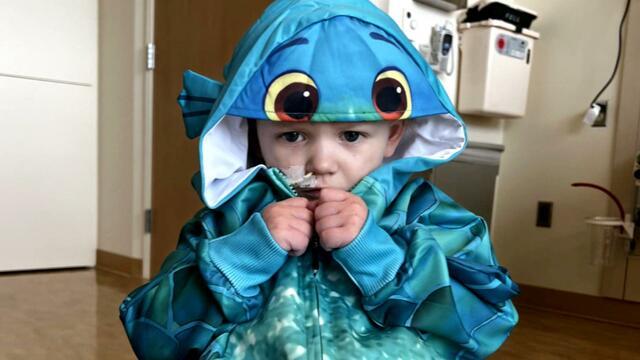▶ Watch Video: Toddler undergoes liver transplant after severe hepatitis
Two-year-old Baelyn Schwab may look healthy now, but just a few weeks ago, the South Dakota toddler’s health took a sudden turn.
“Her eyes looked a little bit yellow. We took her to the doctor, and all of her liver enzyme labs were extremely elevated,” her mom, Kelsea Schwab, told CBS News.
After doctors learned Baelyn’s liver was inflamed, she was flown to M Health Fairview Masonic Children’s Hospital in Minneapolis. She was eventually diagnosed with a severe type of hepatitis — whose cause remains unknown — and is still recovering at the hospital.
Baelyn is one of at least 180 kids infected with severe hepatitis across 36 U.S. states and territories since October, according to the Centers for Disease Control and Prevention. Most recovered, but 15 needed organ transplants and six have died, the CDC told reporters on Friday.
Scientists are baffled by the mysterious outbreak and wonder if it could be linked to the coronavirus pandemic.
Before Baelyn’s diagnosis was confirmed, the family “had no clue what was happening” for the first three days that she was hospitalized, Schwab said.
“Then all of a sudden, the next day hit, and kind of everything just went [into] chaos,” she said. “Her labs skyrocketed. Neurologically, she wasn’t 100% there. It was very hard. You see your kid deteriorating in front of your eyes like overnight.”
As Baelyn’s liver began to fail, she went to the top of the transplant list, and within days a donor was found. After the eight-hour transplant surgery, doctors found that 90% of her removed liver was damaged tissue. Now Baelyn is getting stronger every day.
“I’m actually thrilled with the entire progress,” said her doctor, Srinath Chinnakotla.
The pediatric transplant surgeon had already performed another transplant this year on an even younger child.
“We would do maybe one transplant for liver failure a year, maybe every other year. But this year we have already done two transplants for acute liver failure. That’s certainly a concern for us,” he said.
Even before Baelyn’s illness, it had been a difficult year for the family. In December, the Schwabs had to pull together when their youngest child, 11-month-old Laramie, died from sudden infant death syndrome.
Baelyn has done remarkably well so far in her recovery, but she will have to take anti-rejection medications for the rest of her life and be closely monitored for transplant rejection and the risks associated with the medications.
“I think she’s defied all odds as far as recovery and how fast she’s bouncing back. She, honestly, is an inspiration for me,” her mother said.
Senior medical correspondent Dr. Tara Narula noted that the condition is extremely rare. Most of the patients identified by the CDC have recovered, and the vast majority of cases confirmed last week are considered “retrospective” patients, who may have been diagnosed up to seven months ago, according to the agency. So “not all are recent, and some may ultimately wind up not being linked to this current investigation,” the CDC said in a news release.
“That being said, parents should be aware that the median age is around 2. This is affecting young preschoolers,” Narula said Monday on “CBS Mornings.”
One of the leading hypotheses is that there may be some association with adenovirus type 41, a very common type of infection. Narula said scientists are also looking into a possible connection to COVID-19, which could have “primed” children’s immune system “in such a way that they’re having a hyperimmune reaction.”
“The CDC is going to have to uncover this medical mystery,” she said.
The CDC says parents should look out for the following symptoms:
- fever
- fatigue
- loss of appetite
- nausea
- vomiting
- abdominal pain
- dark urine
- light-colored stools
- joint pain
- jaundice (yellowing of the skin)


































